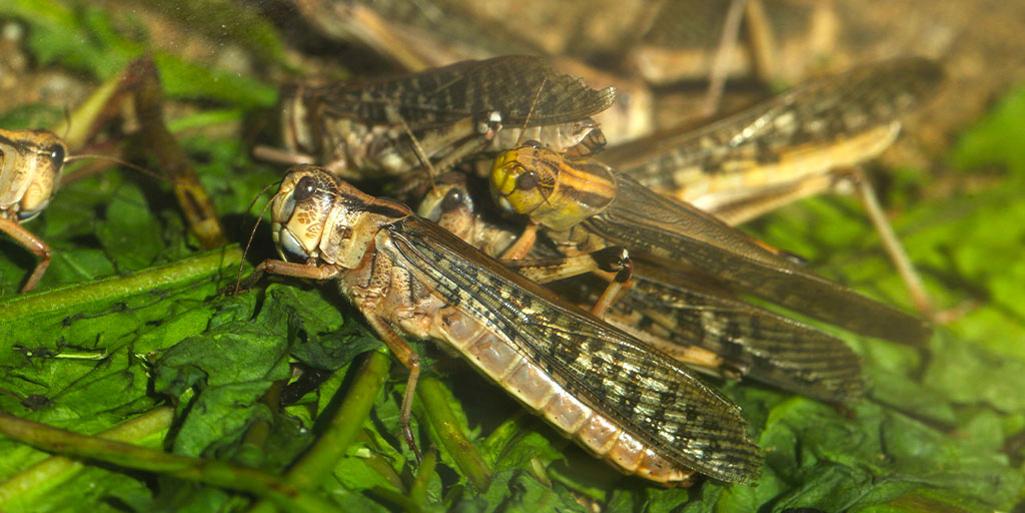Bayer Stands by Kenya and Uganda in Fight Against Desert Locust Devastation
Insecticide donation enables treatment of 170,000 hectares of the most affected fields

MONHEIM, August 6, 2020 /3BL Media/ – Farmers in Kenya and Uganda currently fighting a devastating locust invasion and looming food security crisis are receiving help from Bayer thanks to a donation of 170,000 liters of Decis ULV insecticide. 120,000 liters will be shipped to Kenya and 50,000 liters have already been shipped to Uganda. In both countries, the product will be donated to the local governments to fight the locust swarms. The donation from Bayer, which has a material value of approximately 750,000 Euros, will enable treatment of 170,000 hectares of the most affected fields.
Considered the worst crop pests in the world, locusts ravage everything in their path. According to the United Nation’s Food and Agriculture Organization (FAO), East Africa fields have fallen victim to the worst locust invasion in 25 years. Earlier this year, the FAO issued a call for insecticides, including Deltamethrin, the active ingredient in Decis ULV which is the only one effective in combating the desert locust. Bayer’s insecticide donation from its Crop Science division will support the fight against these harmful migratory pests which are currently threatening food security in the region.
“I am 48 years old and yet I have not seen what I saw when the locust invaded my farm. They came together in countless numbers. You can see them clearly, some are yellow and others are green. When they are flying above an area, it will take more than two hours for all of them to pass. They literally join together and form a dark moving cloud,” said Pius Nyagah Muchenge, a Kenyan farmer, who grows cowpeas and green grams on his four hectares of land. “One of the greatest challenges we experienced is that our traditional methods of fighting such insects were not effective. We tried making noise in the villages including beating iron sheets to irritate the locusts, but this did not do much. We were later supported by the local authority who sprayed the locusts and some died instantly.”
The Bayer donation addresses an urgent need to act as farmers prepare for the arrival of new swarms. Recent heavy rains are expected to cause a further proliferation of locusts in East Africa that could prove to be even more destructive and spread to other African regions.
“Uganda has had four major invasions and continues to receive more invasions which we work tirelessly to eliminate. We therefore thank Bayer for the donation,” said Hon. Vincent Ssempija, Minister for Agriculture, Animal Industries and Fisheries. “This will enable us to control the pests entering Uganda through the East, invading mainly 25 districts.”
“Bayer is committed to shaping a more resilient food system that can withstand threats to food security, like the desert locust,” said Liam Condon, President of Bayer’s Crop Science division. “It’s imperative that we get smallholder farmers the tools they need to fight the devastating infestation, feed their families and communities and maintain their livelihoods, while working to build increased resilience in the future.”
A major food issue for millions of people
Earlier this year, the largest swarm that hit Kenya measured 2,400 square kilometers and was made up of 200 billion locusts. The pests consumed nearly 400,000 tons of food every 24 hours which is equivalent to what 84 million people eat each day. Desert Locusts can travel up to 130 kilometers a day in their frantic race to feed and reproduce.
The devastation means a serious food crisis threatens these East African countries with many countries already experiencing food shortages. In Kenya where 34 percent of the country's GDP comes from agriculture, this invasion marks the worst of its kind in 70 years and is threatening the country's economics and food production. According to the French non-profit organization Acted, food prices are soaring in Mandera County in North East Kenya due to damage to 65 percent of its agricultural production. And, Kenyan livestock farmers just experienced three years of drought from which it takes up to five years to recover.
“Logistics are the main issue in such circumstances; making sure that we bring the right product at the right time at the right place is key to support farmers in such a difficult time,” said Sylvestre Jobic, New Venture Lead for Africa in Bayer’s Crop Science division.
Bayer is also partnering with local governments and NGOs for safe utilization of the product.
The 170,000 liters of Decis ULV donated to Kenya and Uganda were produced in France, in a Bayer industrial site based in Villefranche Limas that specializes in the formulation, packaging and distribution of plant protection products for farmers.
About Bayer
Bayer is a global enterprise with core competencies in the life science fields of health care and nutrition. Its products and services are designed to benefit people by supporting efforts to overcome the major challenges presented by a growing and aging global population. At the same time, the Group aims to increase its earning power and create value through innovation and growth. Bayer is committed to the principles of sustainable development, and the Bayer brand stands for trust, reliability and quality throughout the world. In fiscal 2019, the Group employed around 104,000 people and had sales of 43.5 billion euros. Capital expenditures amounted to 2.9 billion euros, R&D expenses to 5.3 billion euros. For more information, go to www.bayer.com.
Forward-Looking Statements
This release may contain forward-looking statements based on current assumptions and forecasts made by Bayer management. Various known and unknown risks, uncertainties and other factors could lead to material differences between the actual future results, financial situation, development or performance of the company and the estimates given here. These factors include those discussed in Bayer’s public reports which are available on the Bayer website at www.bayer.com. The company assumes no liability whatsoever to update these forward-looking statements or to conform them to future events or developments.

